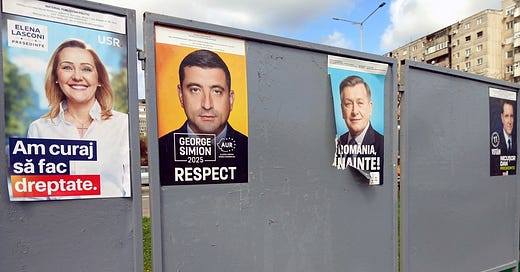Romania. Poland. Portugal.
One weekend, three elections—and the same global question: Can democracy still hold the line?

By Brian O’Neill
Earlier this month, I wrote a piece for The Contrarian about the results of national elections results in Canada, Australia, and Germany. My message was cautious optimism. Liberal democracy had eked out a few wins. Not breakthroughs, but breathers. They didn’t change the game; they bought time.
Time to steady alliances. Time to counteract the drift toward grievance and isolation. Time, maybe, to stop the rot.
This past weekend, the next set of elections landed—and they made that fragile window feel even narrower.
In Romania, voters narrowly rejected George Simion, a MAGA-aligned nationalist who promised to cut off Ukraine, sideline the European Union, and align more openly with U.S. President Donald Trump’s brand of grievance. Only a late-stage surge by urban voters and the diaspora delivered victory to Nicușor Dan, a pro-Western reformer running on clean governance and institutional integrity.
In Portugal, the center-right Democratic Alliance won the most seats but again fell short of a majority. The real shift came from the far-right Chega party, which surged to over 22% and is now vying to become the official opposition. Its message? End the duopoly. Expel immigrants. Trust no one. Prime Minister Luís Montenegro has ruled out coalition with Chega and plans to govern as a minority. But Chega’s rise confirms that what was once dismissed as protest has become a permanent fixture of Portuguese politics. Think of it as the Portuguese version of a party that started like Ralph Nader, polled like Ross Perot, and now punches above its weight like the Freedom Caucus.
And in Poland, where turnout passed 67%, voters have set up a high-stakes runoff. On one side: Warsaw mayor Rafal Trzaskowski, a liberal with establishment baggage. On the other: Karol Nawrocki, a conservative historian backed by the nationalist Law and Justice Party. The result will determine whether the ruling coalition of Prime Minister Donald Tusk can finally push past the obstructionism of a hostile presidency, or whether Poland will return to a more confrontational, illiberal footing. The far right overperformed, and its voters will decide the runoff on June 1.
What connects these cases isn’t ideology. It’s vulnerability, fatigued voters, fractured coalitions, and the persistent appeal of parties that promise disruption, identity, and revenge. Romania didn’t slam the door on Simion’s movement. Portugal didn’t reverse Chega’s momentum. Poland hasn’t settled anything. But the worst-case scenario—the one in which far-right populists swept all three contests—didn’t materialize.
These elections aren’t aftershocks to the Canadian, Australian, and German results. They’re continuations—more signals from a world where democratic resilience is conditional, not guaranteed. The center is still holding. Barely.
Even so, the results have created conditions—not ideal, not permanent, but sufficient—for Europe to enter a critical stretch with a functioning democratic core intact. And that matters, because the next test won’t come at the polls. It will come at the negotiating table.
In late June, NATO leaders will gather in The Hague for a summit that could determine whether the alliance survives in its current form. President Donald Trump has made clear he doesn’t just want increased defense spending—he wants a new threshold: 5% of GDP, far beyond the 2% minimum NATO members agreed to in 2014. As of last year, only 11 of 31 allies had hit that original target. The 5% figure is not a metric; it’s a setup. Trump has already threatened to “encourage” Russian aggression against countries that don’t meet spending goals.
The real message is this: Pay more or prepare to be cut loose.
This is why these recent elections matter. They weren’t just about domestic control. They were about leverage. Victories for liberal, pro-NATO parties—however narrow—give European leaders something to point to at The Hague: a mandate, however fragile, to stand their ground. If Romania had handed Simion the reins or Portugal had pushed Chega into power or Poland had flipped decisively toward the Law and Justice camp, Europe would be walking into the summit fractured, defensive, and easy to corner.
So, the upcoming summit will not just test NATO’s ability to adapt to new threats, but it will also test whether Europe can act as a strategic bloc at all. Germany and others are signaling their support for modified versions of the 5% target, expanding the definition of defense to include infrastructure and cybersecurity. That’s choreography, not compliance, but enough to signal movement without giving Trump the fight he’s clearly seeking.
European leaders need enough coordination to show that they’re not the ones folding first.
What the elections really bought, then, was not just time, but positioning. They allow Europe to say: We’re still governing, our publics still back NATO, and we’re raising defense budgets in good faith. If Trump still chooses confrontation, the fault lines will be clear—and so will the stakes.
What comes next—whether it’s rupture, accommodation, or something blurrier—won’t be decided in speeches. It will be decided by whether the governments that just survived their own democratic stress tests use that breathing room to prepare for the transatlantic one now barreling toward them.
Brian O’Neill, a retired senior executive from the CIA and National Counterterrorism Center, is an instructor on strategic intelligence at Georgia Tech.




The diaspora voted 55.86%-44.14% for Simeon over Dan.
Excellent article summarizing the messy outcomes of the most recent votes in Europe. Thanks for your analysis.